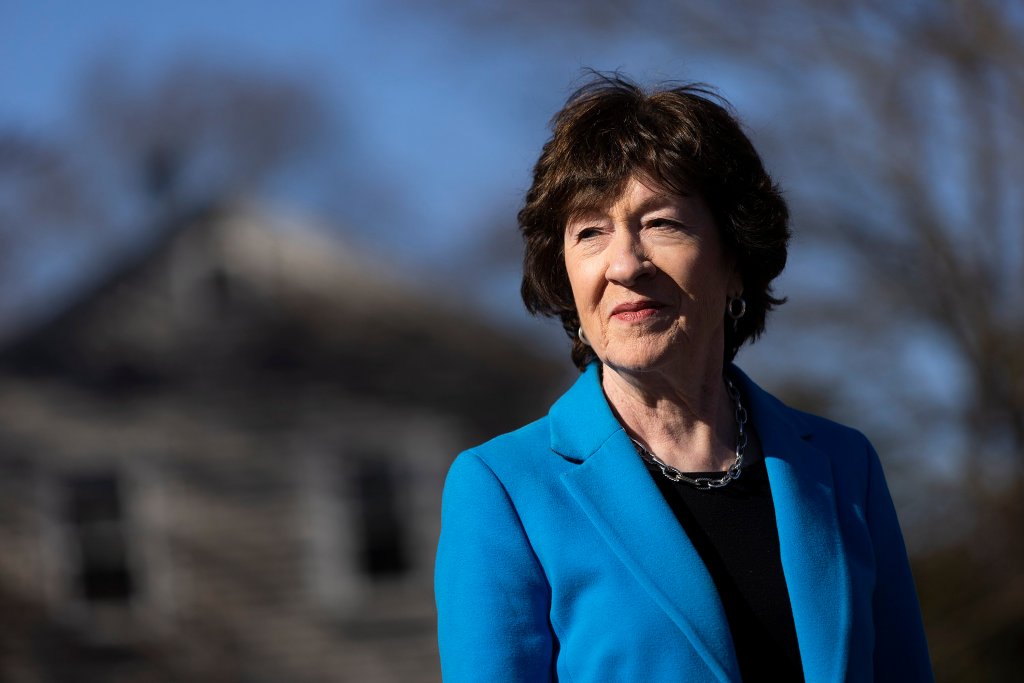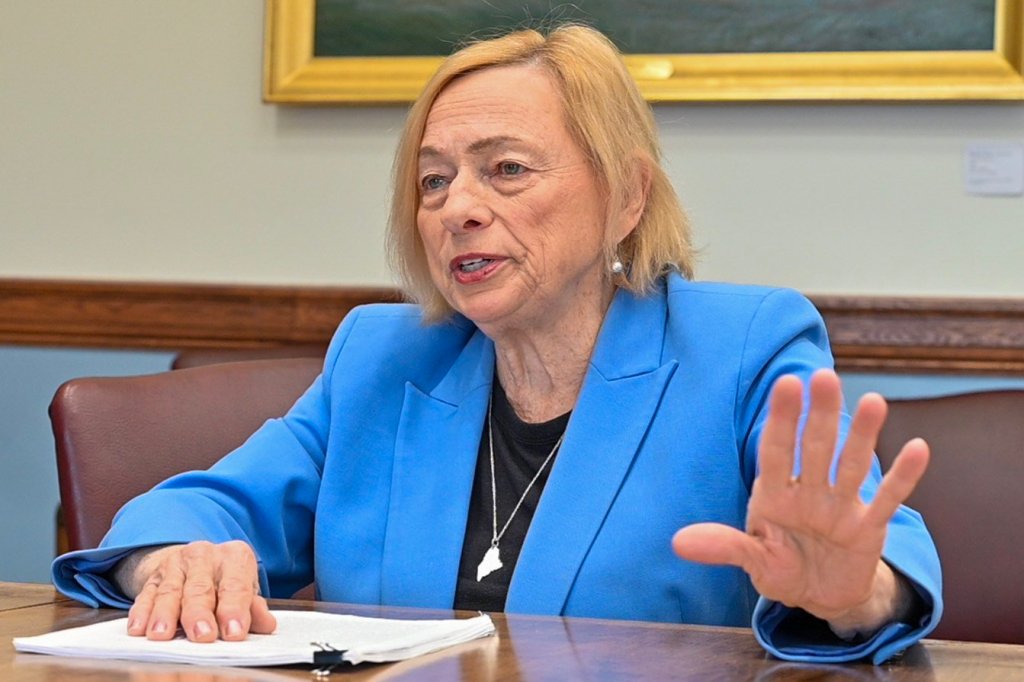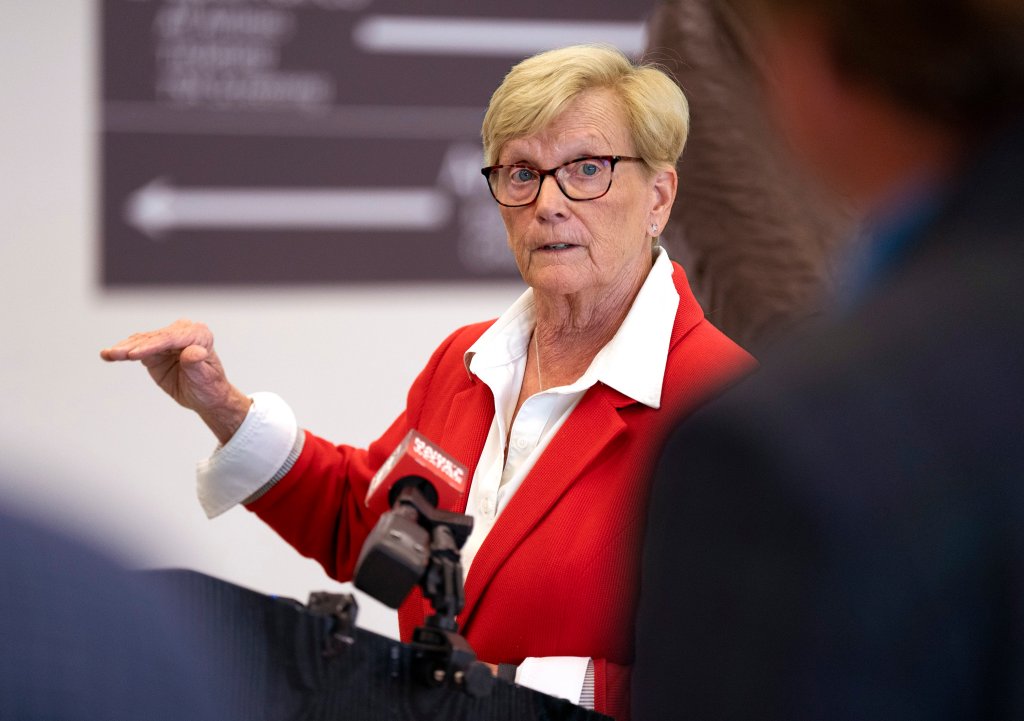U.S. Sen. Susan Collins said Monday that she’s optimistic that an agreement to reopen the federal government could be reached by the end of this week.
Collins, the top Senate appropriator, believes bipartisan talks to end the shutdown will gain steam after Tuesday’s election.
“I don’t want to create false hopes out there, but that is based on discussions that I’ve had with numerous Democrats as recently as last night, as well as with my Republican colleagues,” she said, adding that a compromise could hinge on an agreement over Affordable Care Act subsidies.
The shutdown entered its 34th day on Monday and is on track to become the longest in the nation’s history, eclipsing the 35-day shutdown in 2018-19 during President Donald Trump’s first term.
Collins discussed the shutdown on Maine Public’s “Maine Calling” program Monday. Gov. Janet Mills, a Democrat who is now running for Collins’ Senate seat, and U.S. Rep. Chellie Pingree, D-1st District, also were interviewed, along with leaders of several community groups.
The pains of the shutdown are growing by the day, with uncertainty over food assistance, federal workers going without pay and delays at airports across the country as overworked air traffic controllers stop coming to work.
Collins, a Republican, said her assessment reflects the desire of some senators — primarily Democrats — to wait until after Tuesday’s election to find a path toward reopening the government.
“I hope that once we get past the elections tomorrow, which shouldn’t have anything to do with this issue, but apparently are the indicator that some of the Democrats are looking for, that we will see this entirely unnecessary shutdown come to an end,” she said.
The government shut down on Oct. 1 after Senate Democrats refused to support a Republican stopgap funding bill to temporarily fund the government while lawmakers worked on annual spending bills. That stopgap bill has already passed the House, where Rep. Jared Golden, D-2nd District, was the only Democrat to support it.
Democrats offered their own funding bill — one that would extend subsidies for health care plans under the Affordable Care Act. Those subsidies are scheduled to expire at the end of the year, causing premiums to skyrocket and leave many people unable to afford insurance.
Democrats have said they’re trying to address the ACA subsidies now, because it’s the only time they can force Republicans, who control both chambers of Congress and the White House, to negotiate with them. The stopgap funding bill requires 60 votes in the Senate.
Mills blasted Trump and Republicans for refusing to negotiate with Democrats and causing uncertainty over whether they would comply with a court order to use roughly $5 billion in federal contingency funding to continue food assistance under the Supplemental Nutrition Assistance Program, which ran out of funding on Saturday.
“It’s more than a stalemate,” Mills said. “It’s holding food hostage for political gain, political purposes in Washington, D.C. And I think it’s abominable.”
Trump later announced that he would comply with the order and will use the funding to partially fund benefits for a program that costs $8 billion a month nationwide, including $29 million a month in Maine.
It’s not clear exactly how much beneficiaries will receive, or how quickly they will see value show up on the debit cards they use to buy groceries. November payments have already been delayed for millions of people.
Mills also criticized Trump for building a $350 million ballroom at the White House during the shutdown, rather than negotiating with Democrats to preserve affordable health care for millions of Americans.
Meanwhile, state officials told the Press Herald the state has enough funding to continue paying roughly 2,000 federally funded state employees through November.
Pingree defended the Democrats’ approach, saying the administration has violated the U.S. Constitution by not spending congressionally appropriated funding that was approved on a bipartisan basis.
“I think people are really angry, but they have been so angry and frustrated with this administration disrespecting the role of the appropriations process in Congress,” Pingree said. It’s been a really difficult 10 months for people, and they’re just feeling the strain even more so now.”
Collins, however, said she has been involved in bipartisan talks to reopen the government, including a commitment to holding votes on ACA subsidies and layoffs made by the Trump administration.
She said she supports extending the subsidies, though she would like to see them capped based on family income. And she hopes a public statement by Senate Majority Leader John Thune promising to bring a bill to the floor would be enough to gain Democratic support.
“I don’t want to get ahead of myself on the negotiations, but I’m hopeful that (Thune) would be willing to make a public statement promising to do just that — bring up the legislation,” Collins said.
But Republicans do not plan to discuss extending the ACA subsidies until the government is reopened, she said.
“I believe that once we open government that we will turn to that issue very shortly and it’s important that we do so,” she said.
This story contains reporting from The Associated Press.
Staff Writer Rachel Ohm contributed to this report.




We invite you to add your comments. We encourage a thoughtful exchange of ideas and information on this website. By joining the conversation, you are agreeing to our commenting policy and terms of use. More information is found on our FAQs. You can modify your screen name here.
Comments are managed by our staff during regular business hours Monday through Friday as well as limited hours on Saturday and Sunday. Comments held for moderation outside of those hours may take longer to approve.
Join the Conversation
Please sign into your CentralMaine.com account to participate in conversations below. If you do not have an account, you can register or subscribe. Questions? Please see our FAQs.